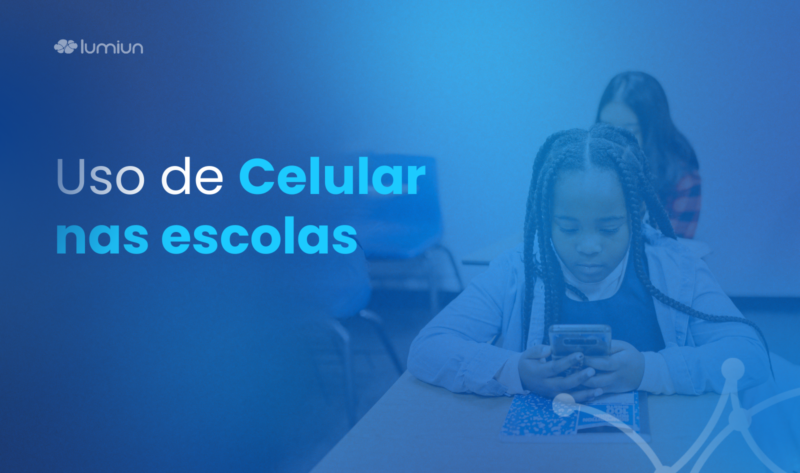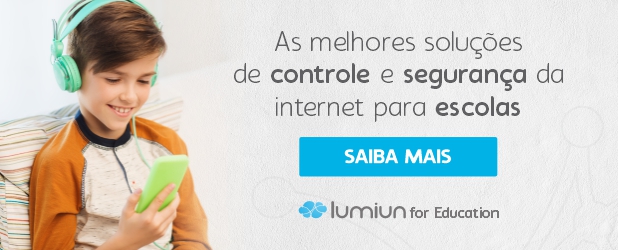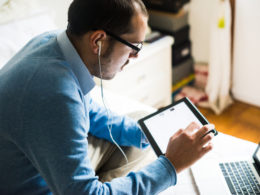For many years mobile phone use in schools has been seen as negative and harmful to children's teaching. However, with the new demands brought by the COVID-19 pandemic, the use of electronic appliances during the teaching journey became critical , making good practices of mobile phone use in schools.
The use of these tools has shown that it is possible to reconcile a good use of cell phones in schools with quality education, using educational tools that help students interact and add even more knowledge and practicality for their routine. For this reason, more and more educational institutions have been combining technology with the teaching-learning process to achieve better results and ensure that their students have complete and effective teaching.
However, for this to be possible, there must be a study on how this process should happen and what are the best ways to deal with the use of these devices in the classroom. In this sense, we have prepared an article on the subject that will help elucidate these issues and understand how use in schools can be combined with education, as long as based on good use practices.
Bonus: To facilitate good cell phone use practices will be available below for a model of mobile phone use policy at school .
How can mobile phone use in schools contribute to learning?
Within the educational routine, the mobile phone can become a true didactic tool to enhance teaching and help students achieve the broader diverse knowledge in the world. For this reason, mobile phone use in schools can add several advantages, as we will see below:
Increased engagement
Using mobile devices within the classroom helps to provide an environment of greater engagement among students, increasing contact and interaction with new technologies. In addition, some students may also be interested in technological tools and feel stimulated by using this device.
Allows the implementation of active methodologies
Using mobile devices within the classroom allows active learning, making students cease to be only information receptors and actively participate in their knowledge process. With the help of their cell phone, students can explore the world in a more personal way and allow interaction with new concepts through autonomous and self -taught processes.
Preparation for Innovation Personalized Teaching
We already know that every year smartphones are optimized to incorporate new technologies and features. Using these devices in the classroom allows students to have contact with new technologies and industry trends, helping to prepare them more assertively for the job market.
Personalized teaching use of educational platforms
The use of educational tools will help students progress at their own pace, enabling content review according to their needs and demand . Thus, each other's learning experience will be personalized, meeting their specific needs.
Use of educational platforms
Educational platforms are valuable allied in the teaching process today. These platforms have audiovisual resources, complementary reading materials, interactive exercises and gamification providing a new learning experience with more interaction and diversification.
Use of cell phones in Brazilian schools: How is this device transforming education?
The use of cell phones in schools has been banned in schools across the country. In the state of São Paulo alone, municipal and state schools prohibit students to access streaming and social networks and use Wi-Fi for personal connections.
Recently in Rio de Janeiro, Decree 53,918 was published on February 2 . In this decree, Mayor Eduardo Paes establishes the prohibition of cellular use in public and private schools of the state , with the objective of ensuring greater concentration and focus of students in their educational tasks.
We can see that in common these prohibitions have a main goal: to avoid distractions of disorders that can be caused by the use of mobile devices during school hours. In this sense, what is expected is that students will have a longer time to perform educational tasks.
Another factor to be considered is that the prohibition of cell phones can also provide greater interpersonal interaction in school intervals, making students more effectively interact with each other. Thus, the socio -emotional capacity of these children and adolescents may be strengthened.
We need to understand that these distractions are mainly caused by restricted use and without supervision of appliances during school hours. It is necessary to establish forms and protocols that allow these devices to be used for the school evolution of the students , without the distractions and the problems that can be triggered by uncontrolled use.
The impacts on socialization and mental health
As we said earlier, excessive use of mobile devices can impair students' interaction in the school environment , impairing their neurodes -development and socialization capacity. In this sense, the use of mobile devices during school hours should be monitored and according to student needs and school demands , preventing excessive use and devices from being used for other things if not schoolwork.
Social networks, entertainment sites, online games, betting platforms. All of this can be very harmful to the development of children and adolescents. For this reason, control of internet access is fundamental within school environments, blocking content that can be considered harmful, and keeping their students away from problems.
Another problem we should consider in this regard is cyberbullying. Bullying in virtual environments has been a big problem today, bringing serious consequences to children and adolescents.
More assertive control of mobile phone use in schools can help reduce this practice and prevent more children from suffering from this virtual harassment that has been causing disastrous consequences for their development and even putting their physical integrity at risk.
Brazil is the second country in the world in cases of cyberbullying, a fact that it was necessary to stipulate a law to include cyberbullying in the list of crimes provided for in the Penal Code, increasing its penalty as a way to minimize its incidence.
Challenges of using mobile phone responsibly within educational institutions
When used intelligently and strategically, the phone can be a very beneficial tool for learning within the school. However, there are some challenges that must be overcome so that this device does not become a problem . Here are the main problems faced to implement mobile phone use in schools:
Reduction of social life
As we mentioned earlier, the student who keeps themselves all the time with the cell phone ends up with a reduction in interaction and its conviviality with colleagues. Excessive cell phone use impacts the social formation of children and adolescents and impairs their conviviality with other colleagues.
Fall in school performance
The impact on school performance is another problem to be faced due to the use of mobile phone in class time. The indiscriminate use of this apparatus inside and outside the school can impair student performance and learning, and it is necessary to stipulate a more efficient control of screen time.
Anxiety problems
Frequent contact with social networks makes children and adolescents constantly view ideal and out of reality content, causing great insecurity about their own life. This exposure, besides being extremely harmful, triggers a process of insecurity and anxiety in these children who can cause serious problems.
Distractions
As we already know, the internet is an environment full of distractions, such as social networks, entertainment site, games, betting pages, streaming platforms, and more. These distractions greatly disturb the student's performance and make the mobile device one of the major traps of the school environment.
Good practices in mobile phone use in schools
If your goal is to use mobile devices for education, it is essential to implement good practices that help in the adaptation process and contribute to all involved to understand the need for these processes. To help you, we have separated five key tips for this adaptation process:
Cell phone always in the silent
Even if there is control over the applications and resources that can be used in the school environment, there are notifications that can disrupt the routine. For this reason, it is important that there is a rule on the phone to always be in the silent, preventing notifications from disturbing not only the student's performance but also of their colleagues.
Suspension of use during important tasks
The phone should be used as a learning tool and only for it. For this reason, the device should be stored while performing tasks that do not need this tool as a way to avoid distractions and prevent the student from having their learning impaired.
Cell phone use policy
For everyone to understand what the rules are and how the mobile phone should be used in the school environment, a mobile phone use policy within the school environment. This policy must be clear and objective and should be available for all students to consult and find out whenever necessary.
Cell Phone Use Policy Model at School
In addition to following state and municipal laws, mobile phone use policy in school is an essential instrument for creating an educational environment conducive to learning. By establishing clear and justifiable guidelines, it is aimed not only to promote a focused and productive environment during classes, but also to protect students' physical, intellectual and moral integrity . In addition, by encouraging the responsible use of technology, the school prepares students to consciously and ethically deal with the challenges of the constantly evolving digital world.
The shared responsibility between students, parents and guardians , outlined in this policy, is fundamental to the success of its implementation. By guiding students about the proper use of mobile networks and devices, and by establishing clear consequences for non -compliance with the rules, the institution reinforces values such as respect, ethics and responsibility.
Thus, to assist school managers to promote a safe and greater learning school environment, a model of “cell phone use policy” to increase digital safety in schools, and inform parents and students about the measure adopted by the school. Click here and download the free model!
Cyberbullying and Digital Security Training
In addition to the distractions that are present in the virtual environment, students need to understand the importance of adopting a respectful posture within the internet . Cyberbullying it is important for students to understand the importance of avoiding this practice. In addition, certain tools within the digital environment can pose a great risk to these students, and some digital safety that are fundamental today.
Internet access control
Internet access control will help school monitor and control which content can be accessed by the school network. Thus, it is possible to prevent students from having access to hazardous and harmful websites that may cause distractions for their routine or even harm their integrity.
Technology allied to education
The use of technological tools to optimize the educational process has been proving a very efficient strategy and for various reasons. In addition to adding a lot of value to the school routine, the use of technology in the learning process can contribute to the improvement of students' understanding and understanding.
Combining the use of technology with learning involves not only a process of adaptation but also a very sensitive approach to educators . It is important for students to understand what the educational objectives of this process are and why the stipulated rules should be obeyed.
Constant monitoring in this case is fundamental to ensure that the process is happening as expected and for students to understand the importance of adopting a respectful posture regarding digital behavior and the tools that are used in the school environment.
The importance of the partnership of parents with the school
The partnership of parents with the school is one of the key elements for the children's child development process. The closer this relationship, the better the results obtained at the end of the period and the more complete school development will be.
It is necessary to understand that education is not a sole responsibility of parents or school, and it is essential to establish a constant information and collaboration process for all objectives to be achieved. In addition to contact with the family, it is essential that there is constant socialization with colleagues and teachers so that this student is completely prepared for life in society.
An efficient partnership allows the increase in school performance, provides greater family involvement and ensures a constant efficient monitoring of the child . The result of this process is a complete cognitive and social development, allowing this student to have all the necessary preparation for his adult life.
How to block harmful sites on the school internet
As we could observe throughout this article, there are several content that may not only impair your child's school performance but also present a huge risk. Although the internet is essential, there are several websites and content that can undermine self -esteem, cause trauma, expose violent situations and even endanger children's lives.
For this reason, blocking certain contents is extremely necessary. For this to be possible, it is necessary to have a
specific control and monitoring tool for educational institutions , to protect students against inappropriate websites, increasing the focus and performance of students and educators and ensuring compliance with privacy laws
With the help of this tool, the school will be able to establish assertive control of the type of access that is carried out on its network and ensure that students are not exposed to content considered malicious or unnecessary. This control is fundamental in the face of the immense dangers that can be found in the digital world.










